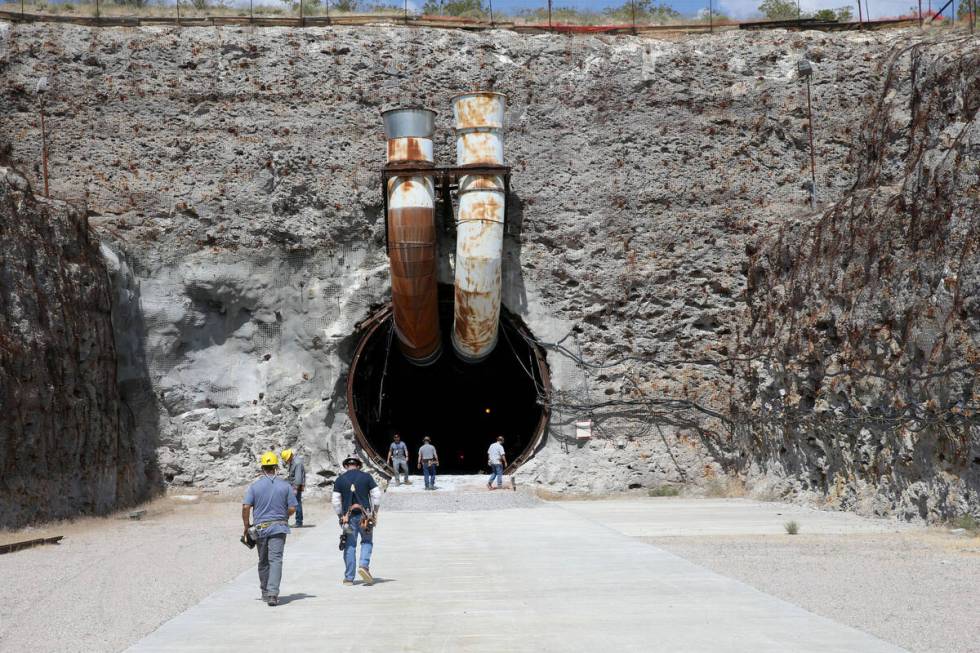Energy Department tries to break Yucca Mountain stalemate

WASHINGTON — The Department of Energy unveiled plans Tuesday to require state and local approval before selecting nuclear waste storage sites, a move intended to break the stalemate over development of the Yucca Mountain repository opposed by Nevada leaders.
The measure to find alternative sites was recommended by government regulators in a report released by the Government Accountability Office in September. The report recommended the Department of Energy seek state and local input, and support, in selecting potential places to store spent nuclear fuel.
Dr. Kathryn Huff, principal deputy assistant secretary for nuclear energy at the Department of Energy, said plans to find new disposal sites would provide “responsible management” of nuclear waste produced by power plants over the past three decades.
A request for information is being issued by the Department of Energy from industry officials, scientists and various stakeholders to develop a plan, a timeline and cost estimates to establish an interim-storage facilities, Huff said.
Nuclear energy generated by existing plants and anew generation of reactors are part of the Biden administration’s long-term plan to move away from fossil fuel and greenhouse emissions.
But a 30-year stalemate over disposal of spent nuclear fuel rods has resulted in nuclear waste to be stockpiled at sites at nuclear reactors, posing potential health and environmental risks.
“We absolutely need nuclear energy,” Huff said at a virtual news conference.
With staunch opposition to permanent waste disposal in Nevada at Yucca Mountain, the Biden administration announced it would restart efforts that began under President Barack Obama to seek interim and permanent storage sites approved by state, local and tribal leaders.
In a joint statement, U.S. Sens. Catherine Cortez Masto and Jacky Rosen, both Nevada Democrats, hailed the Biden administration for moving forward with a process to select storage sites that do not include Yucca Mountain, located 90 miles north of Las Vegas.
Nevada’s congressional delegation, along with Gov. Steve Sisolak, a Democrat, and former Republican Gov. Brian Sandoval, have clamored for a process that gives communities input in selecting a disposal site.
‘Consent-based siting’
Regulators with the Government Accounting Office, the auditing arm of Congress, recommended a return to “consent-based siting” in a September report about the need to address the growing stockpile of waste.
The concept came from a Blue Ribbon Commission during the Obama administration.
Nevada lawmakers have long pushed for such a plan, with legislation filed repeatedly in the House by Rep. Dina Titus, D-Nev., and recently by Cortez Masto in the Senate.
Legislation in the House was voted down, and Senate legislation died for lack action.
Lawmakers in states with nuclear power plants have proposed finding interim sites for storage, but still favor development of Yucca Mountain as a permanent repository to quickly address the growing piles of radioactive waste.
The Department of Energy plan was seen as an endorsement by the Biden administration of Nevada’s interests.
“This is good news for Nevada as we continue to reject efforts to store nuclear waste generated elsewhere,” Titus said, referring to the nuclear waste produced in other states.
Yucca Mountain was designated by Congress in 1987 as the site for permanent storage of waste from nuclear power plants in other states. The law required the federal government to take control of the waste and manage the storage at Yucca Mountain.
That plan has been derailed by local opposition and environmental concerns over groundwater and seismic activity.
The Obama administration shelved the the licensing process to develop the Yucca Mountain project in 2010. Then-Senate Majority Leader Harry Reid, D-Nev., eliminated congressional funding.
An attempt to resurrect the Yucca Mountain project by President Donald Trump ended when he flip-flopped on his administration’s three-year budgeting plan for the Department of Energy and Nuclear Regulatory Commission to complete the licensing process for a construction permit.
Congress has approved funding to develop interim storage, although legal hurdles to the 1987 law must be addressed.
Opposition mounting
The Nuclear Regulatory Commission this year granted a construction permit to build an interim-storage facility in Andrews County, Texas. But that proposal has been met with opposition from Gov. Greg Abbott, a Republican, and the state Legislature.
Another application for an interim-storage facility in Southeast New Mexico is also expected to receive Nuclear Regulatory Commission approval soon, although opposition is mounting there from Gov. Michelle Lujan Grisham, a Democrat, and state lawmakers.
Nuclear power plants that produce no carbon emissions are key to the Biden administration’s long-term plan for clean energy to address climate change. Preserving existing plants, as well as bringing online a next generation of reactors is essential to the goal, Huff told reporters.
But those plans hinge on storage and management of existing nuclear waste in interim, and eventually permanent, repositories. Some the waste is currently stored in casks above ground, creating an even greater risk to communities and the environment.
Historically, potential sites for disposal have been met with local opposition due to fear of transportation and handling of radioactive materials. Government regulators sounded an alarm in their report that exposure could be lethal.
There is roughly 86,000 metric tons of nuclear waste scattered among 75 operating or shuttered nuclear power plants in 33 states, according to the Government Accountability Office report.
Government regulators urged the Department of Energy to draft a policy and craft a process to consolidate the waste at interim or permanent repositories, with local input and approval, to quickly address the problem.
Recommendations also noted the need for congressional action to amend the 1987 law to allow storage at sites other than Yucca Mountain, as the law currently designates.
Contact Gary Martin at gmartin@reviewjournal.com. Follow @garymartindc on Twitter.